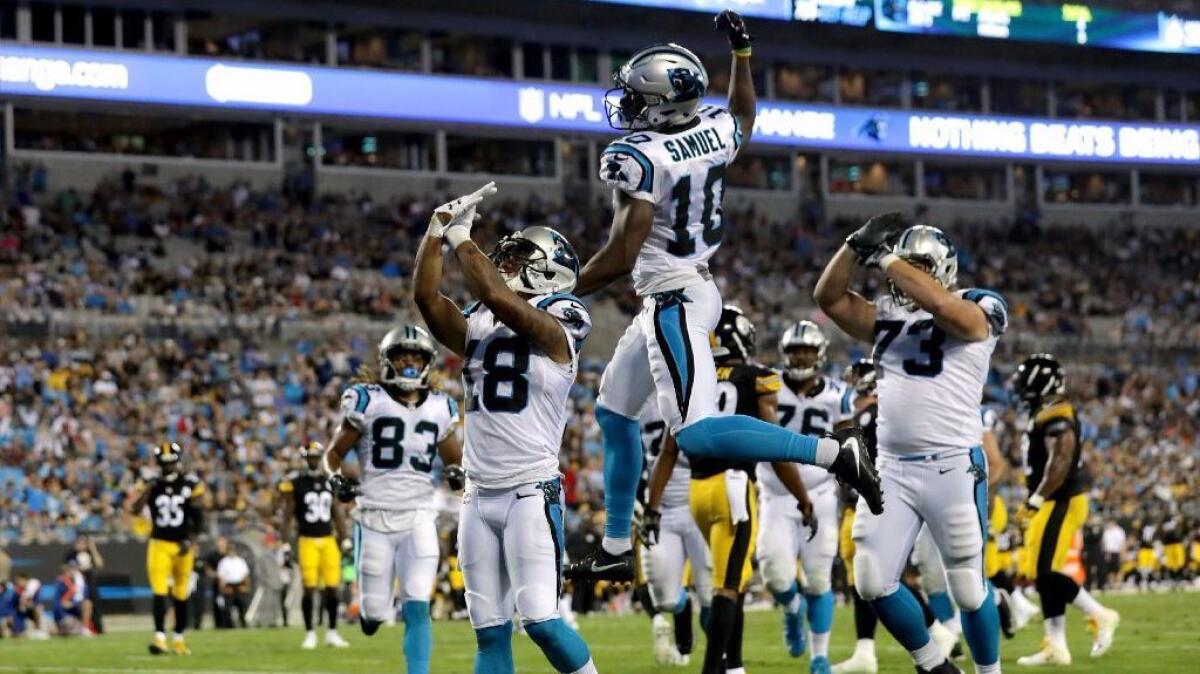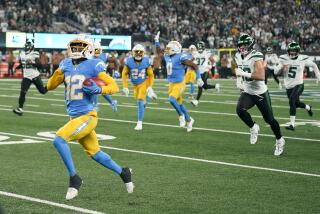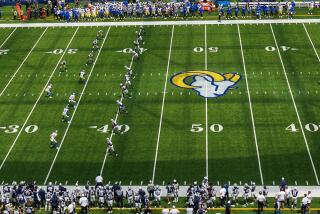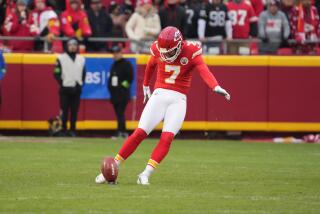NFL will allow the players to celebrate good times this season ... up to a point

- Share via
The NFL still takes itself pretty seriously, but at least it’s loosening the tie a bit.
Beginning this season, the so-called No Fun League will be a little less uptight when it comes to doling out penalties and fines for on-field celebrations. The change was made in May after league executives spent the spring talking to players, coaches, officials and fans about ways to best relax the rigid policy on what players should be allowed to do to express themselves.
Group celebrations will be allowed now, and players will be able to use the football as a prop — as Washington tight end Vernon Davis did last season when he was fined $12,154 for simulating a jump shot after scoring a touchdown.
But it isn’t anything goes.
“We want to make sure that sportsmanship is a big factor here in the way that we implement this,” Commissioner Roger Goodell said. “And of course nobody wanted to see anything that was either violent or sexually offensive to people, and everybody has a little different line there.”
That means receiver Brandin Cooks, now in New England, probably won’t be able to resume his practice of pantomiming an archer who shoots an arrow into the crowd. That is, after all, a weapon.
However, New York Giants receivers Victor Cruz and Odell Beckham Jr. will be able to take imaginary snapshots of each other — that cost them $12,154 each last season — and players all over the league can do snow angels (although San Francisco’s Rashard Robinson was premature with his last fall, doing one when he mistakenly believed a teammate had scored).
When interviewed by the league, several veteran players said the line for them is when celebrating becomes taunting.
“We’d speak to a long-tooth, an older veteran, and they were very clear,” said Troy Vincent, a former player turned NFL executive. “That younger player standing over the top of him, challenging him in any kind of way with the finger pointing … They were very direct: ‘Don’t point at me. Don’t point at the bench area. Don’t stand over the top of me. Don’t flex in front of my face.’ But we don’t mind you enjoying the play.”
Rich McKay, chairman of the competition committee, said the original intent of curtailing celebrations was a good one, but the pendulum had swung too far in that direction.
“There’s so much emotion in the game,” McKay said. “I think sometimes what happens is, just like in rules, you see a play and you say, ‘That play is not acceptable.’ And then all of a sudden you develop a rule to make that play unacceptable and the rule you develop is just too broad. It starts to catch things you really didn’t anticipate.”
McKay said there were 33 celebration penalties last season, and “11 or 12” that involved taunting, so it wasn’t an epidemic.
“When it happens, we just need to be reasonable in our expectations and our explanation,” he said.
Players have more freedom to celebrate, but there is a time issue too. After a touchdown, the 40-second clock starts, and the ball has to be snapped on the extra point or two-point conversion before that expires.
“We’re not going to look up and say, ‘OK, six seconds [for a celebration]? It’s over. Flag,’” said Al Riveron, the league’s new head of officiating. “The players themselves will realize, ‘I’ve got to get on to the next play.’”
Follow Sam Farmer on Twitter @LATimesfarmer
More to Read
Go beyond the scoreboard
Get the latest on L.A.'s teams in the daily Sports Report newsletter.
You may occasionally receive promotional content from the Los Angeles Times.











